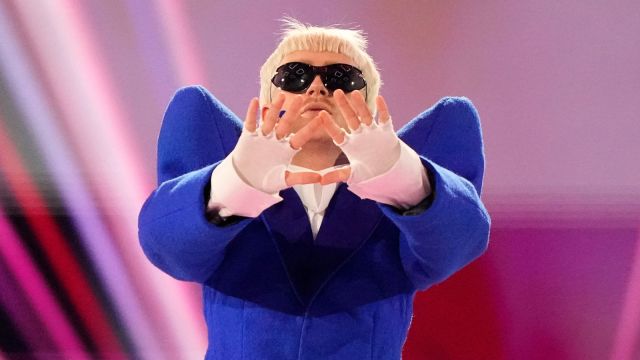 Joost Klein of Netherlands arrives on stage for the introducing of the artists at the dress rehearsal for the final at the Eurovision Song Contest in Malmo, Sweden (AP Photo)
Joost Klein of Netherlands arrives on stage for the introducing of the artists at the dress rehearsal for the final at the Eurovision Song Contest in Malmo, Sweden (AP Photo)A Dutch public broadcaster reacted angrily after the Netherlands’ contestant in the Eurovision Song Contest was dramatically expelled from the competition hours before Saturday’s final over a backstage incident that is being investigated by police.
The European Broadcasting Union, which organizes Eurovision, said Swedish police were investigating “a complaint made by a female member of the production crew” about Joost Klein, and it would not be appropriate for him to participate while the legal process was underway.
Klein had failed to perform at two dress rehearsals on Friday in the Swedish city of Malmo, and organizers had said they were investigating an “incident.” Though rumors had been flying the incident was connected to Israel’s delegation, organizers said it “did not involve any other performer or delegation member.”
The EBU said Klein will not receive any points from national juries or from Eurovision viewers, who help pick the winner, and the Netherlands will not appear on the contest scoreboard. Dutch viewers will still be able to vote in the contest, since viewers in Eurovision member countries are not allowed to vote for their own nation’s act.
It was unclear whether Klein was still in Malmo on Saturday.

Such a last-minute disqualification is unprecedented in the 68-year history of Eurovision, although countries have boycotted the event and in some cases been expelled — including Russia, kicked out after its 2022 invasion of Ukraine.
Dutch broadcaster AVROTOS, one of dozens of public broadcasters that collectively fund and broadcast the contest, said it “finds the disqualification disproportionate and is shocked by the decision.”
“We deeply regret this and will come back to this later,” it said in a statement.
The 26-year-old Dutch singer and rapper had been a bookies’ favorite, as well as a fan favorite, with his song “Europapa,” an upbeat Euro-techno ode to the continent that is also a tribute to Klein’s parents who died when he was a child.
The competition that pits nations against one another for pop music glory has already been marked by division over the inclusion of Israel. It has attracted large protests from Palestinians and their supporters, who say Israel should be excluded because of its conduct of the war against Hamas.
 Earn Coin
Earn Coin Mining
Mining
 Play Games
Play Games




 Spin Wheel
Spin Wheel Miner
Miner Play & Win
Play & Win